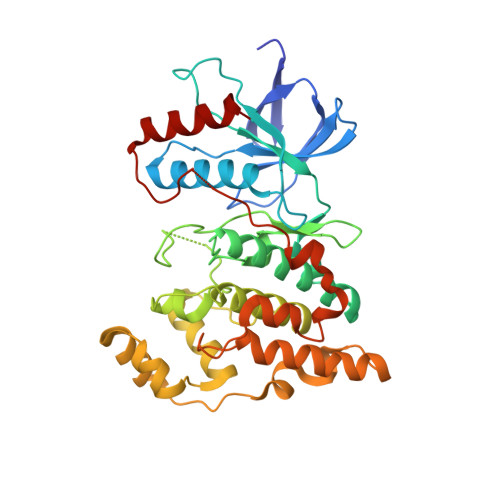Discovery of potent and selective covalent inhibitors of JNK.
Zhang, T., Inesta-Vaquera, F., Niepel, M., Zhang, J., Ficarro, S.B., Machleidt, T., Xie, T., Marto, J.A., Kim, N., Sim, T., Laughlin, J.D., Park, H., LoGrasso, P.V., Patricelli, M., Nomanbhoy, T.K., Sorger, P.K., Alessi, D.R., Gray, N.S.(2012) Chem Biol 19: 140-154
- PubMed: 22284361
- DOI: https://doi.org/10.1016/j.chembiol.2011.11.010
- Primary Citation of Related Structures:
3V6R, 3V6S - PubMed Abstract:
The mitogen-activated kinases JNK1/2/3 are key enzymes in signaling modules that transduce and integrate extracellular stimuli into coordinated cellular response. Here, we report the discovery of irreversible inhibitors of JNK1/2/3. We describe two JNK3 cocrystal structures at 2.60 and 2.97?? resolution that show the compounds form covalent bonds with a conserved cysteine residue. JNK-IN-8 is a selective JNK inhibitor that inhibits phosphorylation of c-Jun, a direct substrate of JNK, in cells exposed to submicromolar drug in a manner that depends on covalent modification of the conserved cysteine residue. Extensive biochemical, cellular, and pathway-based profiling establish the selectivity?of JNK-IN-8 for JNK and suggests that the compound will be broadly useful as a pharmacological probe of JNK-dependent signal transduction. Potential lead compounds have also been identified for kinases, including IRAK1, PIK3C3, PIP4K2C, and PIP5K3.
Organizational Affiliation:
Department of Cancer Biology, Dana-Farber Cancer Institute, Harvard Medical School, Boston, MA 02115, USA.















